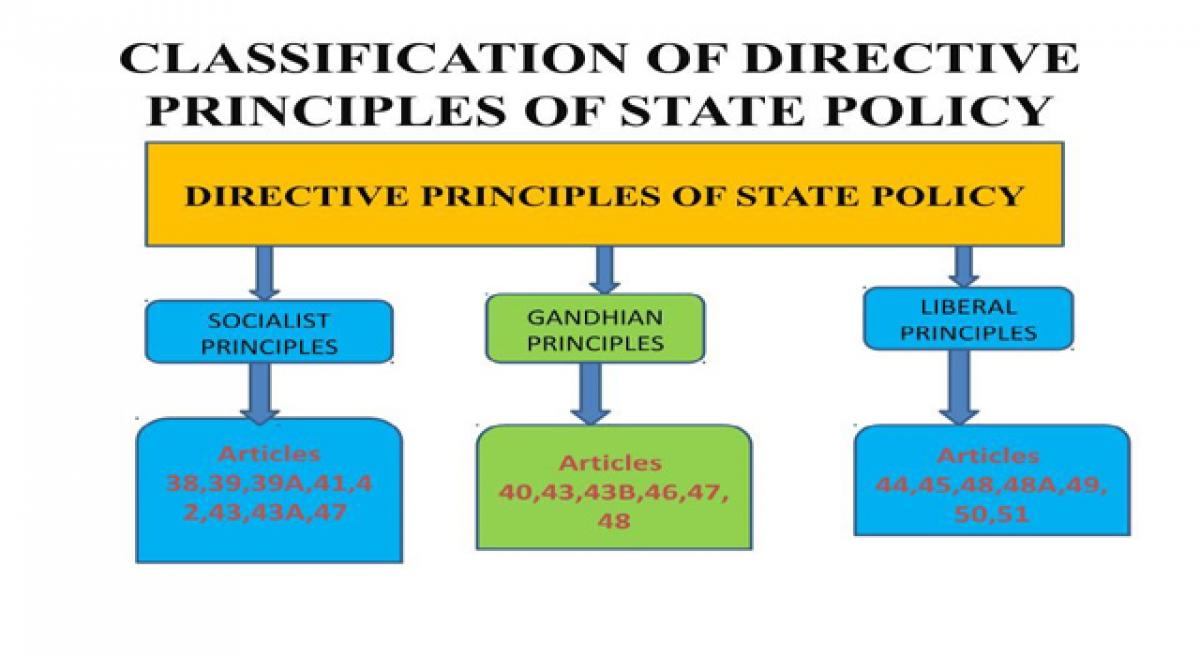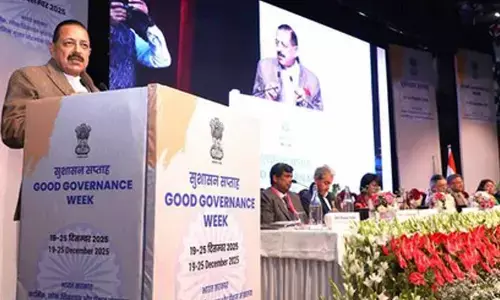Why DPSP not enforceable

The fundamental rights and the Directive Principles of State Policy (DPSP), find common origin in the Sapru Report of 1945, which had divided the fundamental rights into two parts viz. Justifiable and non-justifiable rights.
The fundamental rights and the Directive Principles of State Policy (DPSP), find common origin in the Sapru Report of 1945, which had divided the fundamental rights into two parts viz. Justifiable and non-justifiable rights.
While justifiable rights were incorporated in the Part III; non-justifiable rights were incorporated as directive principles to the state without any guarantee to be enforced via court. Thus, the directive principles are guidelines by the constitution to the state.
The Directive Principles of State Policy contained in Part IV of the Indian constitution constitute the most interesting and enchanting part of the constitution.
The provisions contained in this Part cannot be enforced by any court, but these principles are fundamental in the governance of the country and it shall be the duty of the State to apply these principles in making laws.
The concept of Directive Principles of State Policy was borrowed from the Irish Constitution. While most of the Fundamental Rights are negative obligations on the state, DPSP are positive obligations on the state, though not enforceable in a court of law.
Economic and social rights are predominant in DPSP. They are the end work for both individual good and common good.
Significance of DPSP:
The directive principles plays an ideal before the legislator of India which shows that light while they frame the policies & laws. They are basically a code of conduct for the legislature and administrators of the country. They show the path to the leaders of the country which takes the country to achieve the ideal of the constitution embodied in the Preamble “Justice, Social, Economic, Political; liberty, equality and fraternity”.
It includes articles from Article 36 - Article 51 :
Article-36
In this Part, unless the context otherwise requires, "the State" has the same meaning as in Part III.
Part III defines state as - "the State" includes the Government and Parliament of India and the Government and the Legislature of each of the States and all local or other authorities within the territory of India or under the control of the Government of
India.
Article-37 Application of the principles contained in this Part.-
The provisions contained in this Part shall not be enforceable by any court, but the principles therein laid down are nevertheless fundamental in the governance of the country and it shall be the duty of the State to apply these principles in making laws.
Article 37 says that Directive Principles are not justiciable but are fundamental to the Governance of the Country, and the State has the duty in applying the Directive Principles of State Policies (DPSPs).
If they are not acted upon by the State, no one can move the Courts. The reason for making the DPSPs explicitly unjustifiable are that they require resources which the State may not have at present.
Article-38: State to secure a social order for the promotion of welfare of the people.
- 38(1) The State shall strive to promote the welfare of the people by securing and protecting as effectively as it may a social order in which justice, social, economic and political, shall inform all the institutions of the national life.
- 38(2) The State shall, in particular, strive to minimize the inequalities in income, and endeavor to eliminate inequalities in status, facilities and opportunities, not only amongst individuals but also amongst groups of people residing in different areas or engaged in different vocations.
- Article 38 is one of the socialistic principles.
- The planning commission was established in 1950 to take up the development of the country in the planned manner.
- The successive five year plans is aimed at securing socio economic justice and reducing inequalities of income, status and opportunity
- It aims at social inclusiveness.
Article-39: Certain principles of policy to be followed by the State.-
The State shall, in particular, direct its policy towards securing-
(a) that the citizens, men and women equally, have the right to an adequate means of livelihood;
(b) that the ownership and control of the material resources of the community are so distributed as best to sub serve the common good;
(c) that the operation of the economic system does not result in the concentration of wealth and means of production to the common detriment;
(d) that there is equal pay for equal work for both men and women;
(e) that the health and strength of workers, men and women, and the tender age of children are not abused and that citizens are not forced by economic necessity to enter avocations unsuited to their age or strength;
(f) that children are given opportunities and facilities to develop in a healthy manner and in conditions of freedom and dignity and that childhood and youth are protected against exploitation and against moral and material abandonment.
- It is also one of the socialistic principles.
- Without article 39 there is no constitution, it is a moving spirit.
- Various measures have been taken to utilize the financial resources for promoting the common good. This includes
- Nationalization of the Insurance (1956), The nationalisation of 14 leading commercial banks (1969), Nationalisation of general insurance (1971), abolition of privy purses (1971) and so on
Equal remuneration act (1976) is aimed at providing equal pay for equal work for both men and women.
The child labor prohibition and regulation act (1986) aims at prohibiting the abuse of tender age of the children.
Article -39 A: Equal justice and free legal aid.
The State shall secure that the operation of the legal system promotes justice, on a basis of equal opportunity, and shall, in particular, provide free legal aid, by suitable legislation or schemes or in any other way, to ensure that opportunities for securing justice are not denied to any citizen because of economic or other disabilities.
socialistic principle.
The Legal services authorities act (1987) has established a nationwide network to provide free and competent legal aid to the poor and to organizeLokAdalats for promoting equal justice.
Article-40: Organisation of village panchayats:
- The State shall take steps to organise village panchayats and endow them with such powers and authority as may be necessary to enable them to function as units of self-government.
- This is one of the Gandhian principles
- Three tier panchayati raj system (at village, Taluka and Zilla levels) has been introduced to translate into reality Gandhijis dream of every village being a republic. The 73rd amendment act (1992) has been enacted to provide constitutional status and protection to these panchayati raj institutions.
Article- 41: Right to work, to education and to public assistance in certain cases.
The State shall, within the limits of its economic capacity and development, make effective provision for securing the right to work, to education and to public assistance in cases of unemployment, old age, sickness and disablement, and in other cases of undeserved want.
Socialistic principle -The Indira Gandhi National Old age pension scheme(1995) , Annapurna scheme(2000),CM relief fund, Jan Aushadi scheme(1980) are aimed at promoting article 41
Article-42: Provision for just and humane conditions of work and maternity relief.-
The State shall make provision for securing just and humane conditions of work and for maternity relief.
Socialistic principle
Maternity benefit Act (1961) , and the Equal Remuneration Act (1976) have been made to protect the interests of women workers.
Article-43: Living wage, etc., for workers
The State shall endeavour to secure, by suitable legislation or economic organisation or in any other way, to all workers, agricultural, industrial or otherwise, work, a living wage, conditions of work ensuring a decent standard of life and full enjoyment of leisure and social and cultural opportunities and, in particular, the State shall endeavour to promote cottage industries on an individual or co-operative basis in rural areas.
Article 43A: Participation of workers in management of industries:
- The State shall take steps, by suitable legislation or in any other way, to secure the participation of workers in the management of undertakings, establishments or other organisations engaged in any industry.
- Article 43B: Promotion of co-operative societies
- The State shall endeavour to promote voluntary formation, autonomous functioning, democratic control and professional management of co-operative societies.
- The Minimum Wages Act (1948), The Payment of Wages Act (1936), The Payment Bonus Act (1965), The Contract Labour Regulation and Abolition Act (1970), The Bonded Labour system Abolition Act (1976), The Trade Unions Act (1926), The Factories Act(1948), The Mines Act (1952), The Industrial Distrubutes Act (1947), The Workmen'sCompensation Act (1923), and so on have been enactedto protect the interests of the labour sections.



















